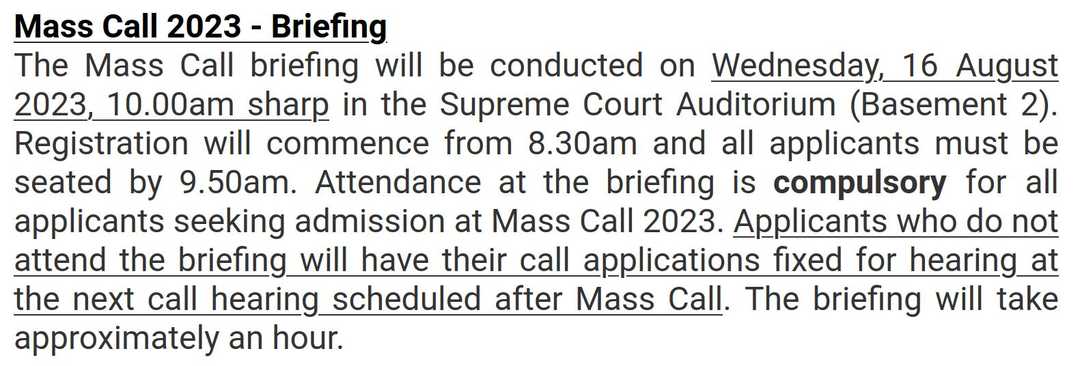Applying for admission to the Singapore Bar: the Mass Call
The mass call briefing and the actual mass call hearing
After you have filed your supporting affidavit (and requested for a hearing), you should be assigned a hearing date. There is generally one admissions hearing a month, except for court vacation periods, and the dates are published on the Judiciary's website. That said, the mass call dates are generally only published about 2 months before the mass call (e.g. late May if the mass call is in the 3rd or 4th week of August).
Attending your call is very much compulsory, i.e. you must attend in order to get called. If you miss the mass call, it is possible to get called at one of the ad-hoc admission hearings (see above) — however this will mean you will be called later and will need to arrange for your own mover.1
Mass call briefing
About a week before the actual mass call, there will be a mass call briefing. This is an administrative briefing covering the procedure to be followed during the mass call itself. In 2022 and 2023, the mass call briefing was held in-person, at the Supreme Court Auditorium.
The mass call briefing is compulsory and the Courts are strict about this. There is no alternative briefing session and anyone who does not attend the briefing will be rescheduled for the next hearing.2 Accordingly, the likely date of the mass call briefing is something you will probably want to consider when planning your call break.
Although the briefing is scheduled to last an hour, it may not necessarily start on time, so it may be best to assume it may take up to 2 hours (e.g. 10am – 12pm).
Since there will likely be a large number of attendees (about 400 in 2023), you may also want to factor in some time to clear security and register prior to the briefing. For this reason, registration will probably commence more than an hour before the actual start time (e.g. 8.30am if the briefing is scheduled to begin at 10am), although there is no need to arrive that early — about 30 – 40 mins before the briefing begins will probably be quite comfortable.
Although the Courts do not appear to prescribe any particular attire for the briefing, the appropriate attire will probably be courtroom attire (i.e. the attire required for members of the public attending public hearings). White shirt and black jacket not required.
The mass call itself
On the day of mass call, you will probably also want to arrive comfortably early and give yourself at least 45 minutes to clear security and register prior to the hearing — there will likely be other hearings that day and you may not be allowed to attend the hearing if you are late or fail to register before registration closes.
Conventionally, each applicant is allowed to invite two guests to the hearing. Although the hearing is notionally a public hearing (and not in camera), only guests with invites will be allowed in.
Do remember to bring:
- a blue pen3
- court robes4
- suitable identification (e.g. NRIC or passport)
- This should generally be your supervising solicitor. If they are not available, your mover can be another lawyer with at least 5 years PQE and a valid practising certificate. There may also be financial consequences that result from a later call date that you should consider — for example, some organisations may pay you a higher salary only after your call date.↩
- See the FAQs↩
- To sign the declaration you are required to make under r 30 and the First Schedule of the Legal Profession (Admission) Rules 2011. Making this declaration is not technically a requirement for you to be admitted: Re Vikram Kumar Tiwary [2021] SGHC 216.↩
- If you intend to do court work, you will probably want to purchase a set of robes, but otherwise you can probably borrow a set from your organisation, a friend, a colleague, etc.↩
